Musella Divorce & Family Law Lawyer, Georgia
Sponsored Law Firm
-
 x
x

Click For More Info:
-
The Law Office of Homer P. Jordan IV, LLC
125 Townpark Drive Suite 300 Kennesaw, GA 30144» view mapDivorce & Family Law Legal Solutions for a Brighter Tomorrow
At The Law Office of Homer P. Jordan IV, LLC in Kennesaw, we are dedicated to helping clients throughout the Atlanta area, including Cobb, Cherokee and Paulding counties.
800-590-3350
Gregory Wayne Holt
✓ VERIFIEDCriminal, Divorce & Family Law, Personal Injury, DUI-DWI, Traffic
Protect Your Rights. Protect Your Future.
Gregory Holt has over 21 years of experience as a trial attorney. Located in Cordova Square at the corner of Carl Vinson Parkway and Leverette Road in... (more)
Preston Franklin Martin
Federal Trial Practice, Labor Law, Family Law, Elder Law
Status: In Good Standing Licensed: 17 Years
James Eliotte Patterson
Family Law, Divorce & Family Law, Civil & Human Rights, Personal Injury
Status: In Good Standing Licensed: 23 Years
Robert A. Berlin
Accident & Injury, Divorce & Family Law, Lawsuit & Dispute, Divorce, Child Custody
Status: In Good Standing Licensed: 62 Years
Kyle Matthew Krejci
Divorce & Family Law, Guardianships & Conservatorships, Adoption, Immigration, Bankruptcy & Debt
Status: In Good Standing Licensed: 14 Years
 Homer Jordan Kennesaw, GA
Homer Jordan Kennesaw, GA AboutThe Law Office of Homer P. Jordan IV, LLC
AboutThe Law Office of Homer P. Jordan IV, LLC Practice AreasExpertise
Practice AreasExpertise

